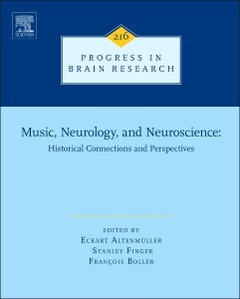Music, Neurology, and Neuroscience: Historical Connections and Perspectives
Directeurs de Collection : Altenmüller Eckart, Finger Stanley, Boller Francois

Music, Neurology, and Neuroscience: Historical Connections and Perspectives provides a broad and comprehensive discussion of history and new discoveries regarding music and the brain, presenting a multidisciplinary overview on music processing, its effects on brain plasticity, and the healing power of music in neurological and psychiatric disorders.
In this context, the disorders that plagued famous musicians and how they affected both performance and composition are critically discussed, as is music as medicine and its potential health hazard.
Additional topics, including the way music fits into early conceptions of localization of function in the brain, its cultural roots in evolution, and its important roles in societies and educational systems are also explored.
Franz Joseph Gall and Music: The Faculty and the Bump
Music, Neurology and Psychology in the 19th Century
Singing by Speechless (Aphasic) Children: Victorian Medical Observations
Some Early Cases of Aphasia and the Capacity to Sing
Benjamin Franklin and his Glass Armonica: From Music as Therapeutic to Pathological
Historical Perspectives on Music as a Cause of Disease
Stroke, Music and Creative Output: Alfred Schnittke and other Composers
Hector Berlioz and His Vesuvius: An Analysis of Historical Evidence from an Epileptological Perspective
Alexander Scriabin: His Chronic Right Hand Pain and its Impact on his Piano Compositions
Frederick Delius: Controversies Regarding his Neurological Disorder and its Impact on his Compositional Output
Robert Schumann in the Psychiatric Hospital at Endenich
Mozart at Play: The Limitations of Attributing the Etiology of Genius to Tourette Syndrome and Mental Illness
Paul Wittgenstein's Right arm and his Phantom: The Saga of a Famous Concert Pianist and his Amputation
Georg Friedrich Händel – A Case of Large Vessel Disease with Complications in the 18th Century
Joseph Haydn's Encephalopathy: New Aspects
Organists and Organ Music Composers
Frédéric Chopin and his Neuropsychiatric Problems
Somnambulism in Verdi's Macbeth and Bellini's La Sonnambula: Opera, Sleepwalking, and Medicine
Opera and Neuroscience
François Boller, M.D., Ph.D. has been co-Series Editor of the Handbook of Clinical Neurology since 2002. He.is a board-certified neurologist currently Professor of Neurology at the George Washington University Medical School (GW) in Washington, DC. He was born in Switzerland and educated in Italy where he obtained a Medical Degree at the University of Pisa. After specializing in Neurology at the University of Milan, Dr. Boller spent several years at the Boston VA and Boston University Medical School, including a fellowship under the direction of Dr. Norman Geschwind. He obtained a Ph.D. in Experimental Psychology from Case Western Reserve University in Cleveland, Ohio where he was in charge of Neuroscience teaching at the Medical School and was nominated Teacher of the Year. In 1983, Dr. Boller became Professor of Neurology and Psychiatry at the University of Pittsburgh where he founded and directed one of the first NIH funded Alzheimer Disease Research Centers in the country. In 1989, he was put in charge of a Paris-based INSERM Unit dedicated to the neuropsychology and neurobiology of cerebral aging. He returned to the United States and joined the NIH in 2005, before coming to GW in July 2014.
Dr. Boller’s initial area of interest was aphasia and related disorders; he later became primarily interested in cognitive disorders and dementia with emphasis on the correlates of cognitive disorders with pathology, neurophysiology and imaging. He was one of the first to study the relation between Parkinson and Alzheimer disease, two processes that were thought to be unrelated. His current area of interest is Alzheimer’s disease and related disorders with emphasis on the early and late stages of the disease. He is also interested in the history of Neurosciences and is Past President of the International Society for the History of Neurosciences. He was the founding Editor-in-Chief of the European Journal of Neurology, the official Journal of the European Federation
- Examines music and the brain both historically and in the light of the latest research findings
- The largest and most comprehensive volume on "music and neurology" ever written
- Written by a unique group of real world experts representing a variety of fields, ranging from history of science and medicine, to neurology and musicology
- Includes a discussion of the way music has cultural roots in evolution and its important role in societies
Date de parution : 02-2015
Ouvrage de 440 p.
19x23.3 cm
Thèmes de Music, Neurology, and Neuroscience: Historical... :
Mots-clés :
Music; Musicians; Neurological Disorders; Modern Music Therapies; Neurology



